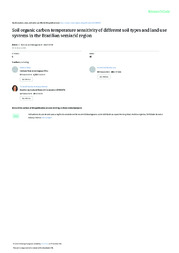Soil organic carbon temperature sensitivity of different soil types and land use systems in the Brazilian semi-arid region.
Soil organic carbon temperature sensitivity of different soil types and land use systems in the Brazilian semi-arid region.
Author(s): MAIA, S. M. F.; GONZAGA, G. B. M.; SILVA, L. K. dos S.; LYRA, G. B.; GOMES, T. C. de A.
Summary: Quantifying the sensitivity of soil organic matter decomposition (SOM) to global warming is critical for predict future impacts of climate change on soil organic carbon stocks (SOC) and soil respiration, especially in semi-arid regions such as northeastern Brazil, where SOC stocks are naturally small. In this study, the responses of the labile and recalcitrant carbon components and soil respiration dynamics were evaluated in three different soil types and land use systems (native vegetation, cropland and pasture) of the Brazilian semi-arid region, when submitted to temperature increase. After 169 days of incubation, the results showed that an increase of 5°C generated an average increase in CO2 emission of 12.0%, but which could reach 28.1%. Overall, the labile carbon (LC) in areas of native vegetation showed greater sensitivity to temperature than in cropland areas. It was also observed that recalcitrant carbon (RC) was more sensitive to warming than LC. Our results indicate that Brazil's semi-arid region presents a substantial vulnerability to global warming, and that the sensitivity of RC and of LC in areas of native vegetation to warming can enhance SOC losses, contributing to positive feedback on climate change, and compromising the productive systems of the region. However, further studies evaluating other types of soil and texture and management systems should be carried out to consolidate the results obtained and to improve the understanding about SOM decomposition in the Brazilian semi-arid region.
Publication year: 2019
Types of publication: Journal article
Keywords: Carbon, Carbono, Decomposição, Matéria Orgânica, Organic soils, Soil, Solo
Observation
Some of Embrapa's publications are published as ePub files. To read them, use or download one of the following free software options to your computer or mobile device. Android: Google Play Books; IOS: iBooks; Windows and Linux: Calibre.
Access other publications
Access the Agricultural Research Database (BDPA) to consult Embrapa's full library collection and records.
Visit Embrapa Bookstore to purchase books and other publications sold by Embrapa.

